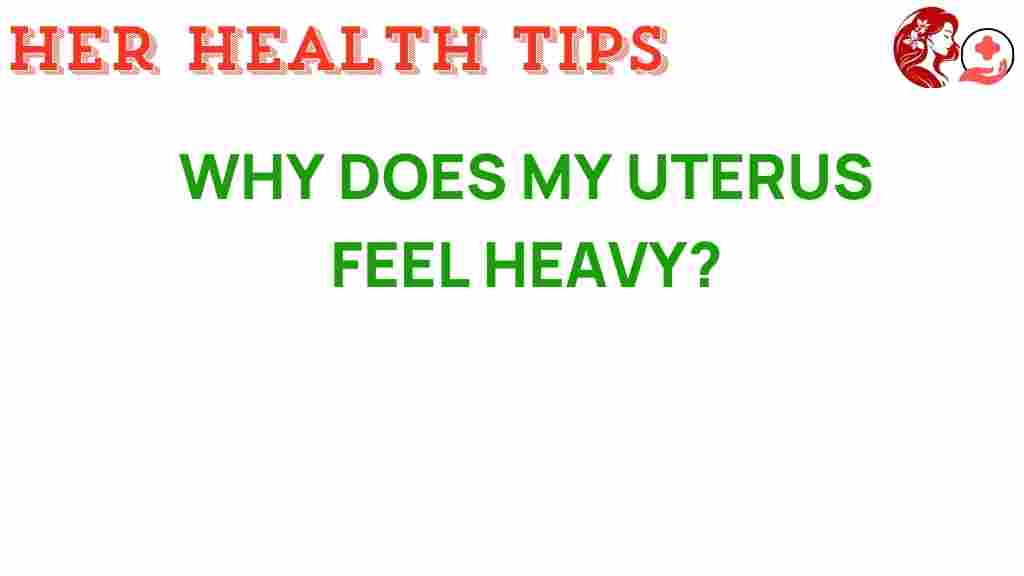Unraveling the Mystery: Why Does My Uterus Feel Heavy?
Many women experience a sensation of heaviness in their uterus at some point in their lives. This feeling can often be accompanied by pelvic pressure, abdominal discomfort, and other symptoms that can be confusing and concerning. Understanding the various factors that contribute to this sensation is crucial for maintaining women’s health. In this article, we will explore the potential causes of heavy feelings in the uterus, including hormonal changes, the menstrual cycle, and gynecological issues like endometriosis.
Understanding the Uterus and Pelvic Pressure
The uterus is a vital reproductive organ situated in the pelvis. It plays a significant role in menstruation, pregnancy, and childbirth. A sensation of heaviness in the uterus can be described as a feeling of pressure or fullness in the pelvic area. This sensation can be caused by various factors, including:
- Hormonal changes
- The menstrual cycle
- Gynecological issues
- Endometriosis
When contemplating these factors, it is essential to pay attention to other accompanying symptoms, as they can provide important clues regarding the underlying cause of the discomfort.
Hormonal Changes and Their Impact on Women’s Health
Hormonal fluctuations throughout the menstrual cycle can significantly affect how your uterus feels. During the menstrual cycle, estrogen and progesterone levels rise and fall, leading to various physical and emotional changes in a woman’s body. These hormonal changes can result in:
- Swelling of the uterine lining
- Increased blood flow to the pelvic area
- Uterine contractions during menstruation
These factors can contribute to a sensation of pelvic pressure or heaviness, especially in the days leading up to menstruation when the body prepares for the shedding of the uterine lining.
The Menstrual Cycle and Its Role in Uterine Discomfort
The menstrual cycle typically lasts about 28 days, although it can vary from person to person. Each phase of the cycle can bring about different feelings in the uterus:
- Follicular Phase: The body prepares for ovulation, and the uterine lining begins to thicken. Some women may feel slight heaviness.
- Ovulation: Occurs around the midpoint of the cycle, and some may experience mild pelvic discomfort due to the release of the egg.
- Luteal Phase: Hormone levels rise, and the uterus may feel heavier as it prepares for potential implantation. Symptoms of premenstrual syndrome (PMS) can also occur, leading to increased pelvic pressure.
- Menstruation: The shedding of the uterine lining can lead to intense cramping and feelings of heaviness.
It’s essential to track your menstrual cycle to understand better how your body responds to these hormonal changes. If you notice significant discomfort during specific phases, it may warrant a discussion with your healthcare provider.
Common Health Concerns Related to Uterine Heaviness
While hormonal changes and the menstrual cycle are common causes of a heavy uterus, several health concerns can also contribute to this sensation. These may include:
- Fibroids: Noncancerous growths in the uterus that can cause increased pressure and discomfort.
- Endometriosis: A condition where tissue similar to the uterine lining grows outside the uterus, leading to severe abdominal discomfort and pelvic pressure.
- Pelvic Inflammatory Disease (PID): An infection of the reproductive organs that can cause pain and pressure in the pelvic area.
- Ovarian Cysts: Fluid-filled sacs on the ovaries that can cause pressure in the pelvic region.
Each of these conditions requires a different approach to treatment, making it essential for women to communicate any persistent or severe symptoms to their healthcare providers.
Endometriosis: A Closer Look
Endometriosis is a common yet often misunderstood condition that affects many women of reproductive age. It occurs when endometrial tissue grows outside the uterus, leading to:
- Severe pelvic pain
- Heavy menstrual bleeding
- Pelvic pressure
Women with endometriosis may also experience pain during intercourse, bowel movements, or urination, which can significantly impact their quality of life. If you suspect that endometriosis may be the cause of your heavy uterus sensation, it is crucial to seek medical advice and possible diagnosis.
Troubleshooting Tips for Uterine Heaviness
If you are experiencing a heavy sensation in your uterus, here are some troubleshooting tips that may help alleviate your discomfort:
- Monitor Your Cycle: Keep a record of your menstrual cycle, noting any patterns associated with your symptoms.
- Stay Hydrated: Drinking plenty of water can help reduce bloating and abdominal discomfort.
- Apply Heat: A heating pad on your lower abdomen can provide relief from pelvic pressure and cramps.
- Exercise Regularly: Engaging in regular physical activity can help improve blood circulation and relieve pelvic pressure.
- Consult Your Doctor: If symptoms persist or worsen, it is essential to seek medical advice for a thorough evaluation.
Being proactive about your health and understanding your body’s signals can help you manage uterine heaviness effectively.
When to Seek Medical Attention
While occasional feelings of heaviness in the uterus can be normal, certain symptoms warrant immediate medical attention:
- Severe pelvic pain that interferes with daily activities
- Heavy or prolonged menstrual bleeding
- Pain during intercourse
- Unexplained weight loss or changes in appetite
If you experience any of these symptoms, it is vital to consult with your healthcare provider to rule out any serious health concerns, including gynecological issues.
Conclusion
Experiencing a heavy uterus can be an uncomfortable and concerning symptom for many women. By understanding the potential causes, including hormonal changes, the menstrual cycle, and gynecological issues like endometriosis, women can take informed steps towards managing their health. It is essential to track your symptoms, practice self-care, and seek medical advice when necessary. Remember, prioritizing your health is key to navigating the complexities of women’s health.
For more information on women’s health and related concerns, consider visiting Women’s Health Organization for resources and support.
Stay proactive about your health, and don’t hesitate to reach out to your healthcare professional with any questions or concerns regarding your uterus and pelvic pressure.
This article is in the category Reproductive and created by HerHealthTips Team
